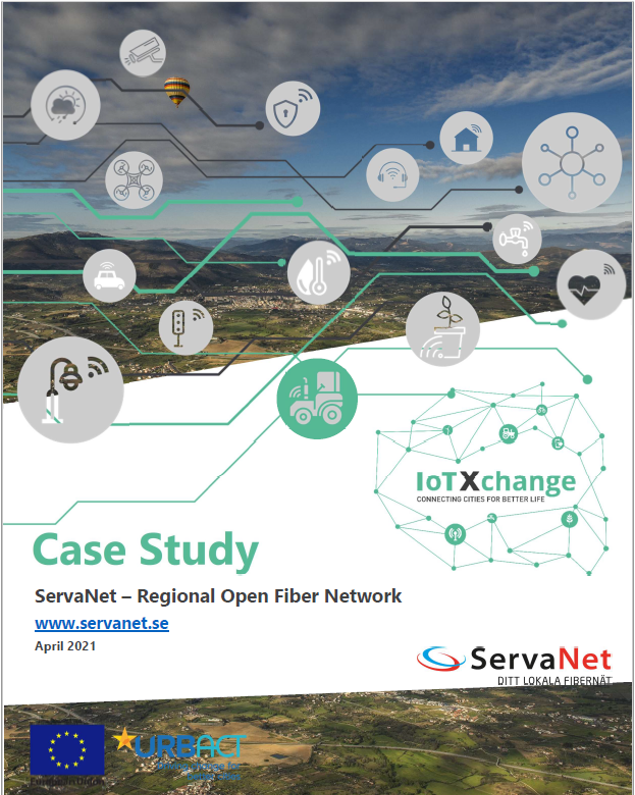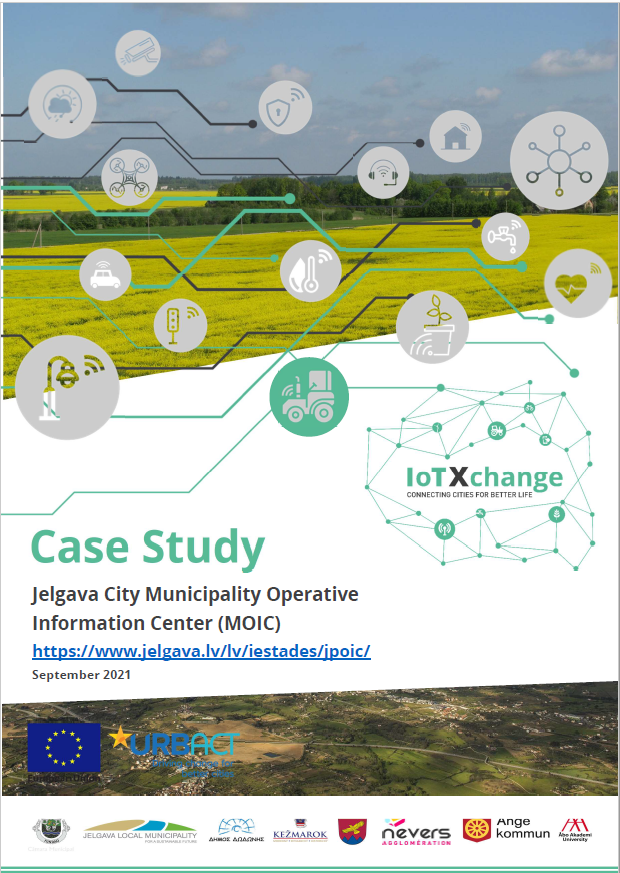“Experience is the best teacher”
Edited on
14 December 2021“Experience is the best teacher” – learning through Case Studies about methods to use technology and innovative business models to improve Urban Development in small cities
By Eurico Neves, Lead Expert of the ‘IoTXchange’ URBACT APN project, CEO of INOVA+ S.A.
It is commonly accepted that ‘Experience is the best teacher ‘. However, this experience doesn’t have to be undergone personally, and can be learnt through the lessons and achievements of others as well. That’s the whole purpose of Case Studies, and that’s how they have been used within the context of the IoTXchange Action Planning Network (APN) of the URBACT programme.

Small and median cities, as those that make up the IoTXChange APN, face big challenges when adopting new technologies. Issues like economies of scale, negotiation power, and widespread rural areas that need to be serve mean that setting up technological infrastructure services is often more complex – and more expensive – in small cities that in big ones.
The IoTXchange APN, like all URBACT networks, exists to make that process a little simpler through the exchange of practical know-how and inspiration between cities around a common theme, in this case the ‘smartisation’ of small cities through Internet of Things (IoT) technologies and infrastructure. Mutual learning and knowledge flow are key in URBACT and learning from what the others have done best is the way to do it right!
It was with this in mind  that during the exploratory phase 1 of the project and within the context of the visits to all partner cities carried out by the Lead Expert and Lead Partner, two practical examples have been flagged as potential Case Studies of relevance for the whole network, to be explored during the current phase 2: the shared business model of ‘Servanet’, a broadband and infrastructure service provider set-up and owned by seven rural municipalities in Central Sweden (including Ånge, our project partner), and the Municipal Operational Information Centre (MOIC) of Jelgava, and that serves both this city and the surrounding Jelgava Local Municipality, other of our project partners.
that during the exploratory phase 1 of the project and within the context of the visits to all partner cities carried out by the Lead Expert and Lead Partner, two practical examples have been flagged as potential Case Studies of relevance for the whole network, to be explored during the current phase 2: the shared business model of ‘Servanet’, a broadband and infrastructure service provider set-up and owned by seven rural municipalities in Central Sweden (including Ånge, our project partner), and the Municipal Operational Information Centre (MOIC) of Jelgava, and that serves both this city and the surrounding Jelgava Local Municipality, other of our project partners.
The first Case Study is a great example of how small municipalities can pool resources and promote intermunicipal service providers, with innovative business models, that can help to surpass the market failure in terms of service provision, due to low rentability or higher investment costs. The complete case study is available online at: https://public.3.basecamp.com/p/BhVSgmJc8kwTMF83VHUQ9KmT
The second Case Study, on its turn, is a high tech example of a control facility that gathers a lot  of urban data (on traffic, surveillance, weather, …) that at present is only used for council purposes (on reports, statistics, crisis management) and shared with municipal police for security issues. It is also provided to universities for research purposes. What makes this data centre different from what exists in other cities is the fact that all data is collected and analyzed by the city, and only shared with municipal police when needs occurs, while in other cities it is directly collected and analyzed by the municipal police, with no further use within the context of the city management. This new Case Study is now also available online at: https://public.3.basecamp.com/p/4grWbz38AjrHxSp9j5nmLjYp
of urban data (on traffic, surveillance, weather, …) that at present is only used for council purposes (on reports, statistics, crisis management) and shared with municipal police for security issues. It is also provided to universities for research purposes. What makes this data centre different from what exists in other cities is the fact that all data is collected and analyzed by the city, and only shared with municipal police when needs occurs, while in other cities it is directly collected and analyzed by the municipal police, with no further use within the context of the city management. This new Case Study is now also available online at: https://public.3.basecamp.com/p/4grWbz38AjrHxSp9j5nmLjYp
In order to develop the Case Studies, working days of an Ad-Hoc Expert made available by the URBACT programme, have been used, respecting the principle of using programme expertise for tasks that are beneficial to the whole network. The original plan (draw in pre-COVID days) foresaw that Case Studies would be developed prior to the Transnational Network Meetings held in Ånge and Jelgava, respectively, allowing to combine the presentation of the Case Studies with study visits to the original sites and face-to-face discussions with the local promoters. That of course was not to be for the reasons we all know, but we managed to stay pretty close to the script, nevertheless. While both meetings have been held on online format during the current year of 2021, in late April in the case of Ånge and mid-September for Jelgava, the case presentation and open discussions moderated by the Ad-Hoc Expert and case promoters still took place, and even a ‘virtual study visit’ to the Jelgava MOIC that you can find here: https://public.3.basecamp.com/p/MScY5eeGDXfdn6D2x2Eci6ba
Taking new approaches towards the digitalization of cities can be hard, risky and costly – often all the three at the same time. Before planning new actions is always better to learn from the lessons of others that have started the path earlier. Especially during the COVID pandemic context, where on-site visits and face-to-face exchanges, so common within the URBACT network, were impossible, Case Studies have proven to be a very useful too for knowledge sharing, that we are glad to have developed within IoTXchange and happily share with other networks and urban practitioners.
 Eurico Neves, @ecneves, is the CEO and Founder of INOVA+ S.A. a leading firm in innovation studies in Europe. He directly created or participated in the creation of more than 10 new firms, in the services and information technologies field, since 1997. Before he has worked for the European Commission in Luxembourg at DG Enterprise between 1994 and 1997 and has participated in the team developing the European Green Paper on Innovation in 1995. In 2017 he was invited to become a member of the World Economic Forum's ‘Digital Leaders of Europe’ Community, that he joined in July of that year, having since contributed to the annual report “Innovate Europe - Competing for Global Innovation Leadership” presented in the Davos 2019 WEF forum. He cooperates with URBACT since 2005 and is the currently the Lead Expert of the IoTXchange APN since September 2019.
Eurico Neves, @ecneves, is the CEO and Founder of INOVA+ S.A. a leading firm in innovation studies in Europe. He directly created or participated in the creation of more than 10 new firms, in the services and information technologies field, since 1997. Before he has worked for the European Commission in Luxembourg at DG Enterprise between 1994 and 1997 and has participated in the team developing the European Green Paper on Innovation in 1995. In 2017 he was invited to become a member of the World Economic Forum's ‘Digital Leaders of Europe’ Community, that he joined in July of that year, having since contributed to the annual report “Innovate Europe - Competing for Global Innovation Leadership” presented in the Davos 2019 WEF forum. He cooperates with URBACT since 2005 and is the currently the Lead Expert of the IoTXchange APN since September 2019.
Submitted by Mariana Salvado on
